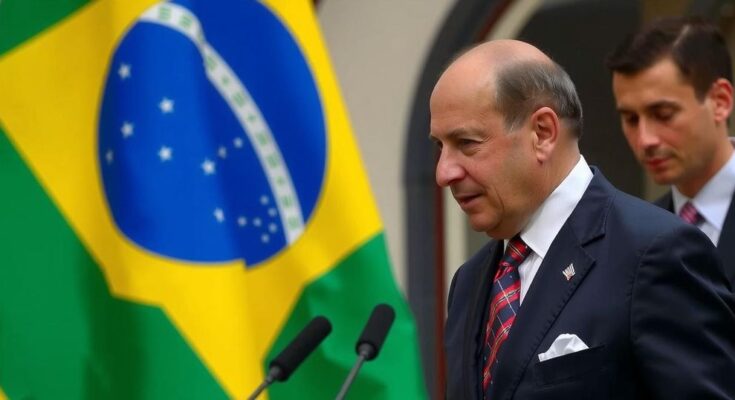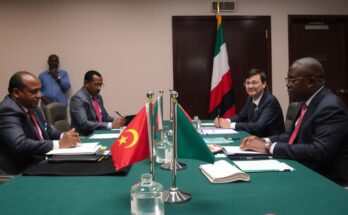Egypt’s President Abdel Fattah Al-Sisi is attending the G20 summit in Brazil, focusing on key issues for developing countries such as poverty, governance reform, and sustainable energy. This summit marks Egypt’s fourth participation, reflecting its growing international stature. Al-Sisi will highlight Egypt’s development challenges while addressing regional crises, particularly the Israeli-Palestinian conflict. The summit comes amid global uncertainty due to U.S. political transitions and ongoing geopolitical conflicts, making its outcomes unpredictable.
President Abdel Fattah Al-Sisi of Egypt embarked on a journey to Rio de Janeiro, Brazil, on Sunday to participate in the G20 summit scheduled for November 18–19. Ahmed Fahmy, the spokesperson for the Egyptian presidency, articulated that the summit will focus on pivotal matters concerning developing nations, particularly social inclusion, the eradication of poverty and hunger, reform of global governance structures, and energy transition aligned with sustainable development goals. This summit will mark Egypt’s fourth engagement with the G20, underscoring its increasing significance on the global stage and its influential role in regional affairs. During the summit sessions, President Al-Sisi will articulate Egypt’s initiatives concerning sustainable development and the hurdles faced by developing countries in fulfilling their developmental objectives amidst ongoing global political and economic turbulence. Fahmy emphasized that the President’s remarks would also address the regional crises, notably the escalating conflict in Palestine and Lebanon, while highlighting Egypt’s endeavors to foster stability in the Middle East. The summit will witness the formal launch of the “Global Alliance for the Fight Against Poverty and Hunger,” a Brazilian-initiated international alliance aimed at enhancing social inclusion and combating poverty and hunger through coordinated financial and knowledge resources. Moreover, President Al-Sisi is expected to engage in discussions with various global leaders to explore avenues for bolstering bilateral relations and enhancing cooperation towards achieving sustainable development outcomes and restoring regional peace and security. Leaders from G20 nations are set to engage in dialogues amidst a backdrop of significant global uncertainty, influenced notably by political upheaval in the United States and persistent economic challenges worldwide. The summit agenda centers around the theme “Building a Just World and a Sustainable Planet,” featuring sessions dedicated to social inclusion, reforming global governance, and promoting sustainable development. A consensus declaration is anticipated at the conclusion. The G20 summit occurs during a particularly instable period, influenced by the forthcoming U.S. presidential election. While President Joe Biden’s attendance is confirmed, the emerging positions of President-elect Donald Trump introduce an element of unpredictability, particularly concerning U.S. engagement in global initiatives. Simultaneously, recent developments in German politics, including the ousting of Finance Minister Christian Lindner, have further complicated the landscape, leaving Chancellor Olaf Scholz in a precarious leadership position. The summit also endeavors to address several urgent global challenges, including the ongoing conflict in Ukraine and its implications, as well as the adverse effects of climate change, which have been exacerbated across the globe. The initial session will focus on tackling poverty and hunger, tackling social inequality, and promoting international tax cooperation, while subsequent sessions will address governance reforms and sustainable development strategies. Given the multifaceted global crises at play, the results of the summit remain uncertain.
The G20 summit is a pivotal international forum dedicated to promoting global economic cooperation and addressing pressing challenges facing both developed and developing nations. The summit brings together the world’s major economies to address critical issues such as poverty alleviation, sustainable development, governance reform, and climate change. Each participating nation has the opportunity to highlight its unique challenges and priorities while contributing to the global dialogue aimed at fostering cooperation and progress in achieving the Sustainable Development Goals (SDGs). Egypt’s participation highlights its growing influence as a key player in regional stability and development, especially in light of its efforts to support initiatives addressing poverty and global governance.
In conclusion, President Al-Sisi’s participation in the G20 summit underscores Egypt’s commitment to addressing global challenges faced by developing countries. The summit’s focus on essential topics such as poverty eradication, sustainable development, and international cooperation reflects the pressing realities of our times. The socio-political dynamics, particularly relating to the U.S. and German leadership, add layers of complexity to the discussions, thereby necessitating a concerted effort from all participating nations to foster a collaborative approach toward achieving meaningful outcomes.
Original Source: www.dailynewsegypt.com




